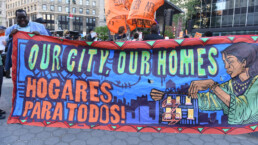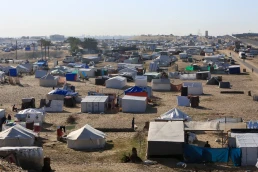A raft of laws at the state level has given tenants new tools to fight eviction. But when it comes to the broader housing crisis, most elected leaders have done little more than kick the can down the road.
By Sam Russek, Dissent
For a few months in 2020, it seemed like the CDC eviction moratorium had ushered in a new public understanding of property relations in the United States: rent payments could simply pause, and for a time people unable to make rent could avoid homelessness. While justices of the peace in much of the country found wiggle room in the CDC order, evicting as they saw fit, places like New York held firm. Albany passed a throng of its own protections between April 2020 and January 2021, and over 200,000 evictions in New York City were stalled. But on January 15 of this year, the last of those protections expired as rent skyrocketed across the country, wages fell even further behind inflation, and COVID-19 emergency relief programs ran on empty. In response to these deeper problems, most elected leaders have done little more than kick the can down the road.

Take New York City’s 2017 Right To Counsel (RTC) law: Following a wave of activism in coalition with the Democratic Socialists of America (DSA), the city became the first in the country to legally require courts to offer tenants (with incomes under 200 percent of the state’s poverty line) an attorney when facing eviction. It was, at first, a success. Evictions decreased by 41 percent from 2013 to 2019, and between 2020 and 2021 84 percent of tenants represented by RTC attorneys remained housed. The rollout was initially staggered by Zip Code. But the pandemic impelled lawmakers to make the program citywide to meet increased need, and in doing so exposed its Achilles’ heel: there simply aren’t enough lawyers to go around.
In early May, the nine paralegals at RiseBoro Community Partnership, an RTC legal aid group operating in Brooklyn, were each juggling around sixty eviction cases. Some of those cases, one paralegal told me, had become more about buying time—for the tenant to apply for rental assistance or locate a new apartment, or for their children to finish out the school year before being displaced—than winning outright in court. With nearly 200,000 evictions backlogged, and around 7,000 additional cases filed each month in New York since protections were was lifted, time is scarce. In March and April, some legal aid organizations announced that they had to limit the number of cases they could manage or stop accepting new cases altogether. They pled for the courts to slow down. The courts refused, and now more and more tenants are facing a judge on their own.
Recent Posts
Why Are Democratic Lawmakers Still Meeting With Netanyahu?
July 12, 2025
Take Action Now Pictures show Democrats like Chuck Schumer standing next to Netanyahu, smiling.By Sharon Zhang, Truthout A bipartisan group of…
Stop Israel’s Dystopian “Humanitarian City” Plan—Before It’s Too Late
July 11, 2025
Take Action Now For the past 20 months, the world has watched—and largely enabled—a genocidal campaign in Gaza. Over 55,000 Palestinians have been…
The “Liberal” International Order Is Criminalizing Palestine Protests
July 11, 2025
Take Action Now As Western governments repress Palestine solidarity and enable Israel’s impunity, the “liberal international order” is no longer…
Politicians Are Betraying Gen Z On Climate
July 10, 2025
Take Action Now While Gen-Zers thrift, knit, crochet, and find other ways to reduce our footprints, Trump and the GOP are greenlighting more climate…




